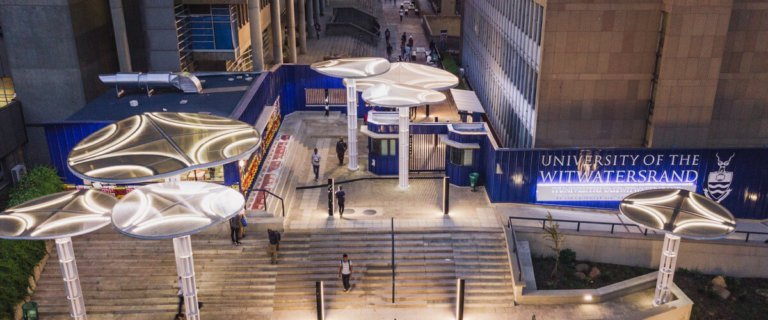
This story is part of our “Universities the world needs” series which profiles universities that make an impact through their innovative research culture and curriculum.
In a world grappling with a climate emergency, the University of Witwatersand (Wits) in Johannesburg, South Africa is leading the way with vital, high-impact research and education.
According to Deputy Vice-Chancellor of Research and Postgraduate Affairs Professor Zeblon Vilakazi, the University aims to develop critical thinkers who are cognisant of the effects of climate change and who can tackle the emergency with fervour.
“We have an opportunity to provide our communities with graduates who have the knowledge and skills necessary to transform society and to live as responsible local and global citizens,” says Vilakazi.
Let’s take a look at the sort of high-impact, climate-focused research Wits has conducted lately.
Research initiatives that sustain your future
Two senior academics from the University of the Witwatersrand’s Global Change Institute (GCI) played leading roles in the writing and editing of the new Our Future on Earth report which was published by the International Science Council (ISC), in association with global science organisations such as the United Nations (UN).
Throughout the report, the authors tackle the difficulties and challenges that society is facing on Earth, including climate, political economy, the deep ocean, forced migration, fake news, biodiversity, food and transformation.
According to Wits climatologist Professor Coleen Vogel, who co-authored an article in the report, these global challenges will force us to rethink how we consider, design and construct our livelihoods, the meaning of work and our economic future.
 Wits researchers are also helping to tackle the global issue of e-waste in a bid to create a circular economy where everything that is used can be recycled, reused and repurposed into new products.
Wits researchers are also helping to tackle the global issue of e-waste in a bid to create a circular economy where everything that is used can be recycled, reused and repurposed into new products.
“Almost everything from your phone can be recycled.

Source: University of the Witwatersrand
“Our cell phones are going to become the next mines. If we can take all the rare earth metals out of our phones rather than of out of the ground, we can reuse them and create a circular economy,” says Head of the School of Chemistry Professor Dean Brady.
Taking this a step further are the chemistry experts at Wits. The School of Chemistry is developing and using new products derived from biomass to replace fossil fuel-based chemicals, which will result in neutral net CO2 production.
At Wits, change starts with you
In the research world of Wits, green is the new black.
One Wits research team is exploring the potential of “green tyres” as an eco-friendly alternative to conventional tyres.
After conducting a year-long trial that involved a long-haul truck, a highly controlled test environment and the two different types of tyres, the team found that at 80 km/h, the long-haul truck burnt eight percent less fuel on green tyres than on ordinary tyres.
That means eight percent less CO2 was emitted into the atmosphere from a single truck!
MSc student Rehaan Abdulla, who was involved in the study, said: “We were thinking the difference would be more in the ballpark of five to six percent. So, there appears to be massive advantages of using the rolling low resistance tyres.”

Another instance of impactful climate-focused research is by Wits Senior Lecturer in Human Geography Dr Melanie Samson.
A team of 16 students got to join her research team looking into the issue of waste pickers in South Africa.
They found that, in contrast to being marginalised, maligned and discarded, these waste pickers were found to be critical to South Africa’s recycling economy. More importantly, they also turned out to be a cost-effective alternative to private company contracts.
“They are skilled knowledge-workers who separate our materials for us and the city. They turn our rubbish into a thriving recycling economy,” she says.
Build a better campus and world
 Imagine a campus powered by sunlight. Buildings that use and reuse heat flow and other energies efficiently. Showering from a source that manages water sustainably. Finding ways to use wastewater and stormwater. Exploring the use of bicycle and carpooling as alternatives to cars.
Imagine a campus powered by sunlight. Buildings that use and reuse heat flow and other energies efficiently. Showering from a source that manages water sustainably. Finding ways to use wastewater and stormwater. Exploring the use of bicycle and carpooling as alternatives to cars.
That’s the Wits campus.
Wits is greening its operations in line with the 2030 Sustainable Development Goals and implementing efficiency programmes in a serious bid to tackle the climate crisis.
Asking the bigger questions, building a sustainable campus and making the world a more sustainable place one research project at a time – these are just three of the many reasons making the University of the Witwatersrand an inspiring place to study.
So if you want to be part of high-impact research university striving against climate change, click here to start your journey with a Wits world-changing postgraduate degree.
Follow the University of the Witwatersrand on Facebook, Twitter, YouTube and LinkedIn







